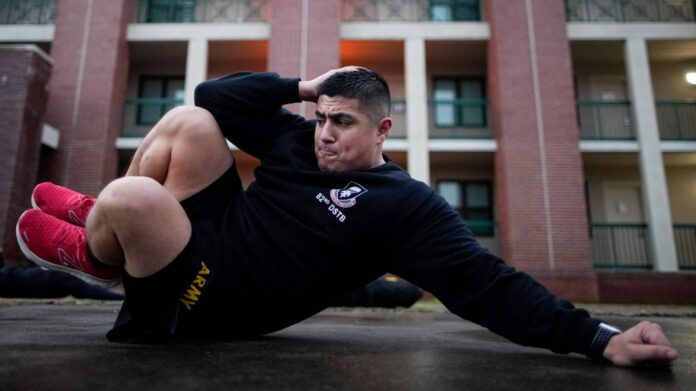Washington: After gaining 30 pounds during the COVID-19 pandemic, U.S. Army Staff Sgt. Daniel Murillo is finally getting back into fighting shape. Early pandemic lockdowns, endless hours on his laptop and heightened stress led Murillo, 27, to reach for cookies and chips in the barracks at Fort Bragg in North Carolina. Gyms were closed, organised exercise was out and Murillo’s motivation to work out on his own was low.“I could notice it,” said Murillo, who is 5 feet, 5 inches tall and weighed as much as 192 pounds. “The uniform was tighter.”Murillo wasn’t the only service member dealing with extra weight. New research found that obesity in the U.S. military surged during the pandemic. In the Army alone, nearly 10,000 active duty soldiers developed obesity between February 2019 and June 2021, pushing the rate to nearly a quarter of the troops studied. Increases were seen in the U.S. Navy and the Marines, too.
“The Army and the other services need to focus on how to bring the forces back to fitness,” said Tracey Perez Koehlmoos, director of the Center for Health Services Research at the Uniformed Services University in Bethesda, Maryland, who led the research.Overweight and obese troops are more likely to be injured and less likely to endure the physical demands of their profession. The military loses more than 650,000 workdays each year because of extra weight and obesity-related health costs exceed USD 1.5 billion annually for current and former service members and their families, federal research shows.
More recent data won’t be available until later this year, said Koehlmoos. But there’s no sign that the trend is ending, underscoring longstanding concerns about the readiness of America’s fighting forces.
Military leaders have been warning about the impact of obesity on the U.S. military for more than a decade, but the lingering pandemic effects highlight the need for urgent action, said retired Marine Corps Brigadier General Stephen Cheney, who co-authored a recent report on the problem. “The numbers have not gotten better,” Cheney said in a November webinar held by the American Security Project, a nonprofit think tank. “They are just getting worse and worse and worse.”
In fiscal year 2022, the Army failed to make its recruiting goal for the first time, falling short by 15,000 recruits, or a quarter of the requirement. That’s largely because three-quarters of Americans aged 17 to 24 are not eligible for military service for several reasons, including extra weight. Being overweight is the biggest individual disqualifier, affecting more than 1 in 10 potential recruits, according to the report. “It is devastating. We have a dramatic national security problem,” Cheney said.
Extra weight can make it difficult for service members to meet core fitness requirements, which differ depending on the military branch. In the Army, for instance, if soldiers can’t pass the Army Combat Fitness Test, a recently updated measure of ability, it could result in probation or end their military careers. Koehlmoos and her team analysed medical records for all active duty Army soldiers in the Military Health System Data Repository, a comprehensive archive. They looked at two periods: before the pandemic, from February 2019 to January 2020, and during the crisis, from September 2020 to June 2021. They excluded soldiers without complete records in both periods and those who were pregnant in the year before or during the study.

































